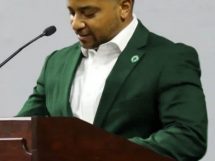Says lack of cooperation stalled results
LOUISVILLE, Ky. (Dec. 14, 2016) — Mike Harmon, Kentucky’s Auditor of Public Accounts, today released the findings of an examination by his office of the governance of the University of Louisville Foundation, and its relationship to the University of Louisville. The examination, which was originally announced in June 2015 and continued by Harmon in February, cites eight findings related to the Foundation and UofL.

“The biggest obstacle we had to overcome, which is a big reason why it took my office so long to complete, was the lack of cooperation by the prior administration to provide the documentation and information we requested as part of our exam,” said Harmon. “That is why Finding 1 of our report cites the delays and inconsistencies in obtaining information, which we believe also contributed to the high level of dysfunction and mistrust among both the UofL and the Foundation boards that has eroded the public’s confidence in the university.”
In addition to Finding 1, the governance examination also cited seven other findings:
- The decision by former President James Ramsey to appoint his ex-chief of staff as acting chief administrative officer with the Foundation appears to violate the Foundation’s bylaws. Because the appointment did not follow specific bylaws on nomination and approval by the full Foundation board, the appointment by Ramsey may not be valid or a binding agreement.
- The Foundation board compensated Ramsey beyond the amount approved by the University Board of Trustees, and beyond the amount set in the terms of his contract. It appears the Foundation board overstepped its authority and circumvented the authority of the Board of Trustees by altering Ramsey’s base pay at the university.
- UofL’s chief financial officer was not included in any meetings of the Foundation Board’s Finance Committee in violation of bylaws and in direct conflict with the CFO’s contract with the Foundation. The CFO stated he was not informed about his status as an ex officio member of the committee, never included in or notified of the committee’s scheduled meetings, and never received a request to work with or support any actions or functions of the Foundation.
- Conflicts among members of the Foundation board and the UofL Board of Trustees created an environment of distrust resulting in a dysfunctional governing environment for UofL and the Foundation. While members of both boards acknowledged to auditors there was conflict, they had varying opinions on the cause.
- Administrative operations between UofL and the Foundation were at times indistinguishable, leading to ineffective governance. The dual role of one person as both president of the university and the Foundation, along with the comingling of administrative operations, created confusion and questions of transparency. The confusion and concentration of authority led to ineffective governance that gave management too much influence and a lack of checks and balances.
- The loans of $67 million in endowment funds, which were budgeted to UofL, to the Foundation and an affiliated organization were done without the knowledge and approval of the Board of Trustees. The decisions to make the loans ignore the fact that UofL and the Foundation are two separate entities, and the effect of the transactions created a lending agreement that bypassed those with fiduciary responsibilities to approve such activity.
- Foundation board members don’t receive orientation despite the growing complexity of its operations. Since its creation in 1970, the UofL Foundation has expanded to include 14 affiliates, three tax increment financing (TIF) areas within the University’s campuses, and manages an endowment that has a market value as of August of nearly $685 million.
“I believe our examination and recommendations give the current and future leadership of both UofL and the Foundation a road map to address the issues my office uncovered,” said Harmon. “The University of Louisville is an important institution for our commonwealth, and because of its importance and influence I believe it is crucial for the administration and leadership at the Foundation and UofL take the steps necessary to restore public confidence through improved oversight and increasing transparency.”




















Add Comment